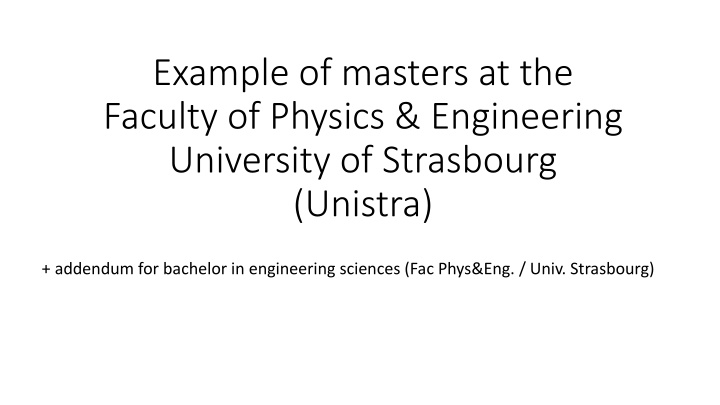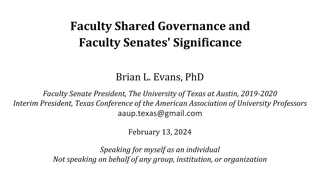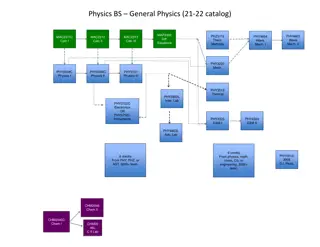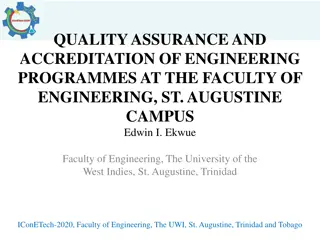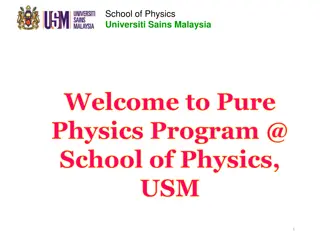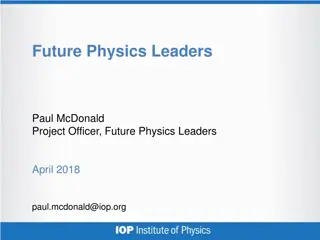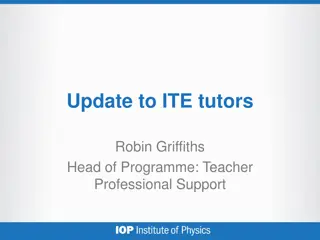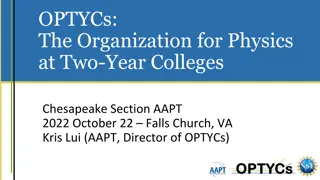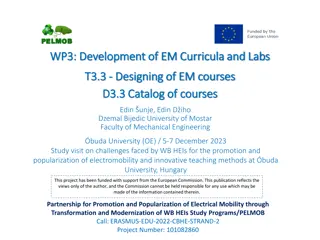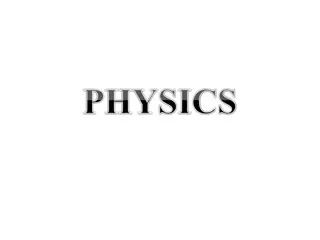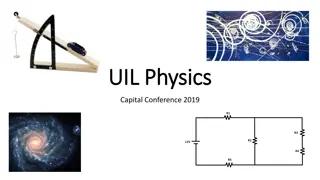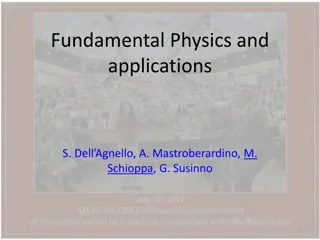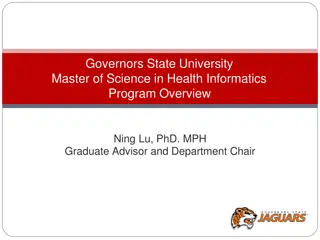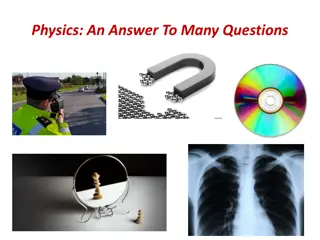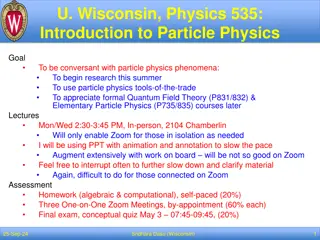Master's Programs at University of Strasbourg - Faculty of Physics & Engineering
Explore the Master's programs offered at the Faculty of Physics & Engineering, University of Strasbourg (Unistra) with specializations in Astrophysics, Condensed Matter Physics, Radiation Physics, Subatomic Physics, and Cell Physics. The curriculum includes a strong theoretical background, specialized subjects, internships, and research opportunities. Additionally, the syllabus for the first year covers Quantum Mechanics, Statistical Physics, Experimental Physics, and more, with a focus on deepening knowledge in the field. Unistra boasts extensive research labs supporting these programs.
Download Presentation

Please find below an Image/Link to download the presentation.
The content on the website is provided AS IS for your information and personal use only. It may not be sold, licensed, or shared on other websites without obtaining consent from the author.If you encounter any issues during the download, it is possible that the publisher has removed the file from their server.
You are allowed to download the files provided on this website for personal or commercial use, subject to the condition that they are used lawfully. All files are the property of their respective owners.
The content on the website is provided AS IS for your information and personal use only. It may not be sold, licensed, or shared on other websites without obtaining consent from the author.
E N D
Presentation Transcript
Example of masters at the Faculty of Physics & Engineering University of Strasbourg (Unistra) + addendum for bachelor in engineering sciences (Fac Phys&Eng. / Univ. Strasbourg)
University of Strasbourg / master scheme 2ndYear 1st Year / common core S1 Stengthening/deepeni ng theoretical background of the bachelor degree S3 Fully specialized subjects S4 S2 Introducing specialized subjects Internship
Master in Physics National Standard in Azerba djan : 120 ECTS Unistra: 120 ECTS Curricula of M. Sc. in Physics in Azerbaijan and Unistra Humanities 14 (12 %) Electives (could be taken from a different faculty, i.e. Biology, Philosophy) 9 (8 %) Disciplinary 106 (88 %) 111 (92 %) Elements of disciplinary subjects Disciplinary subjects NS Azerbaijan / 106 ECTS Unistra / 111 ECTS Faculty choice 70 (66 %) 51 (46 %) NS MoE 6 (6 %) Student choice 39 (35 %) Internship / research vocational issue 6 (6 %) 4 weeks=4 % curriculum / 94 weeks) 30 (27 %) 15 weeks=23 % curriculum / 64 weeks) Internship / pedagogy vocational issue 6 (6 %) 4 weeks=4 % curriculum / 94 weeks) Academic dissertation 18 (17 %) 12 weeks=13 % curriculum / 94 weeks
Master in Physics at University of Strasbourg Unistra offers a Master Diploma in Physics (within the field Sciences & Technology ) with 5 specialisations (5 research-based curricula): Astrophysics (research oriented Master leading to a PhD programme) Condensed matter and nanophysics (research oriented Master enabling to enter a PhD programme) Radiation physics, detection, instrumentation and imaging (possible both professional issue & PhD) Subatomic physics and astroparticles (research oriented leading to a PhD programme) Cell physics (research oriented leading to a PhD programme) Offer is based on the supporting research labs Reminder: Unistra hosts in total 72 research labs, of which 9 whole institutes (> 100 staff) involve physics oriented research teams.
U. of Strasbourg : Example of syllabus for 1st year of Master Same curricula for all 5 specialisations in Physics in Semester 1 and Semester 2 S1 S2 1 Quantum mechanics & statistical physics / 9 ECTS 1 Nuclear mattet, elementary particles, and condensed matter physics / 9 ECTS 2 Programming & present days research in physics / 6 ECTS 2 Computer programming and numerical simulation 1 / 3 ECTS 3 - Experimental physics 1 / 6 ECTS 3 Physics at the lab / 12 ECTS 4 Electives to be chosen by student among the following (2 subjects / 6 ECTS) Mechanics of continuous media The constituents of Universe and their observation Group theory Ionizing radiations and their detection General relativity Nanostructures and nanophysics Mentored project Arow of time & advanced statistical physics Variational principles and analytical mechanics Introduction to quantum collisions Critical phenomena and out of equilibriuml statistics 4 - Optional (student choice) 1 subjects / 3 ECTS Particles & astroparticles Physics of stars Atomic & molecular physics Relativistic quantum mechanics Mentored project Introduction to the physics of living Numerical applications in physics Soft matter physics Optics & photonics 5 Free option (validated by the head of master) / 3 ECTS 5 Free electvies (i.e. electives to be chosen by student and validated by the head of master) / 3 ECTS
U. of Strasbourg: example of syllabus for 2ndyear of Master Condensed matter physics & nanophysics (research oriented) , Semesters 3 and 4 S3 4 compulsory subjects to be chosen by student (9 ECTS), among the following: 1 Advanced quantum mechanics applications to condensed matter physics / 6 ECTS Mentored project: computer processing of a project in physics Magnetism and magnetic nanostructures Theory and modeling of the electronic structure of solids Spintronics Optical microscopies Interactions in soft condensed matter Surfaces and Interfaces in soft condensed matter Electron dynamics: charges and spins Electronic properties of low dimensional systems Biophysics Scanning probe microscopies Many-body physics applied to condensed matter Dynamics of complex systems Scattering technics for condensed matter Open quantum systems Electron microscopy 2 Light-matter interaction applications to condensed matter physics / 6 ECTS 3 Advanced statistical physics out of equilibrium processes / 6 ECTS 4 4 compulsory subjects to be chosen by student / 9 ECTS 5 Free option (validated by the head of master) / 3 ECTS S4 / 15 weeks internship / written report & defense / 30 ECTS
Important note for the faculties of physics (BSU & SDU) and MoE: it could be considered creating at the faculty of Physics a Bachelor Degree in Engineering Sciences: the 1st year could be the same as B.Sc. in Physics and 2ndyear would offer teaching in engineering sciences. For ex., at the faculty of physics and engineering of U. of Strasbourg, there is also a bachelor in engineering sciences. This one is best suited to apply for master in micro- and nano-electronics, master in mecatronics, master in industrial engineering. The B. Sc. Eng. curriculum is described hereafter After a bachelor in physics, students may also apply for a master in materials science at the faculty of physics and engineering (master in materials science & engineering)
Bachelor Engineering sciences / electronics, signal and automatics 1st year identical to first year of the bachelor in physics S1 S2 1 Physics 2 / 9 ECTS Vibrations & Waves Geometrical optics Mathematical methods for physics Experimental physics 2 2 Maths & Computer science / 9 ECTS Maths for sciences 2 Computer science (Linux environment) 3 Molecules and bounds / 3 ECTS 4 Languages / 3 ECTS 5 Free option / 3 ECTS among Chemical equilibria Geosciences: the lithosphere Case studies in engineering sciences Materials of the future Mechanics 2 Special relativity 6 Personal profesional project / 3 ECTS 1 Physics 1 / 9 ECTS Mechanics 1 Electrostatics Supervised personal work Experimental physics 1 2 Maths 1 / 9 ECTS Maths for sciences 1 Supervised personal work 3 Chemistry 1 / 6 ECTS Architecture of matter Transformations of matter 1 Experimental chemistry 1 4 Languages / 3 ECTS 5 - University working methodology / 3 ECTS
Bachelor Sciences for engineers / electronics, signal and automatics 2nd& 3rd years specifics to the BScE S3 S4 1 Sciences for engineers 1 (electrical engineering) /6 ECTS Electricity & Electromagnetism Study of an amplification chain 1 Electrical engineering 2 / 6 ECTS Fourier s series & tranforms Electrotechnics 2 Electrical engineering 3 / 6 ECTS Electronics Microelectronics 3 Maths for engineers 2 / 3 ECTS Functions of sevral real variables 4 Thermodynamics / 3 ECTS 5 Materials & processes / 6 ECTS Materials Manufacturing processes, assembly tecjhnologies & metrology 4 Languages / 3 ECTS 5 Professional development / 3 ECTS Operator apprenticeship (4 weeks) 2 Sciences for engineers 2 (mechanical engineering) / 6 ECTS General mechanics Mechanical construction 3 Maths for engineers 1 / 6 ECTS Analysis Algebra 4 Computer science / 6 ECTS Architecture of computer s OS Programming 5 Languages / 3 ECTS 6 - Personal profesional project / 3 ECTS Corporate communication Mentoring of the personal project
Bachelor Sciences for engineers / electronics, signal and automatics 2nd& 3rd years specifics to the ScE bachelor S5 S6 1 Maths / 6 ECTS 1 Electronics 2 / 12 ECTS Mathematical methods for electronics Analog electronics 2 Digital electronics 2 Waves and materials / 9 ECTS Waves Introduction to Labview Physics of semiconductors 2 Converters / 9 ECTS Static transducers 3 Electronics 1 / 9 ECTS Signals and systems Electromechanic transducers Analog electronics 1 3 Automatics / 9 ECTS Functions of sevral real variables 4 Computer science / 3 ECTS 5 Languages / 3 ECTS 4 Volontary internship (engineering assistant 4 to 8 weeks) / 3 ECTS (extra)
Other issues for graduates in Physics at the B. Sc. Level Fac. Phys&Eng. / Univ. Strasbourg, France
Master in Applied physics and physical engineering Accessible to bachelor in engineering sciences or a bachelor in physics (under restriction) : 3 master curricula Mecatronics & Energetics Micro- and Nano- Electronics (designed bachelor programme described in the previous slides) Computational engineering Each of these curriculula may lead to vocational integration or to PhD enrolment within one of the dedicated supporting labs
Master in Materials science & engineering Following a bachelor in physics : 3 master curricula Materials Engineering & Nanosciences Surface Design & Innovative materials Polymers Engineering (with a possible French-German track) Each of these curriculula may lead to vocational integration or to PhD enrolment within one of the dedicated supporting labs
